Watson's Caring Model and Meta-Paradigms in a Case Study
VerifiedAdded on 2022/08/09
|7
|1639
|24
Report
AI Summary
This report presents a case study of an 85-year-old man, Philip, admitted to the Geriatric Emergency Management (GEM) Team, diagnosed with depression. It applies Jean Watson's theory of caring, focusing on the meta-paradigms of person, health, environment, and nursing. The report explains how these paradigms are applied to Philip's care, emphasizing the importance of concern, kindness, and understanding Philip's perspective. It discusses the nurse's role in fostering a supportive environment and promoting Philip's well-being, highlighting the benefits of Watson's theory in enhancing patient care and self-actualization. The study also reflects on new insights gained from applying the model, emphasizing the importance of a caring approach in nursing practice, and how it influences the health sectors and the patient’s faster improvement.
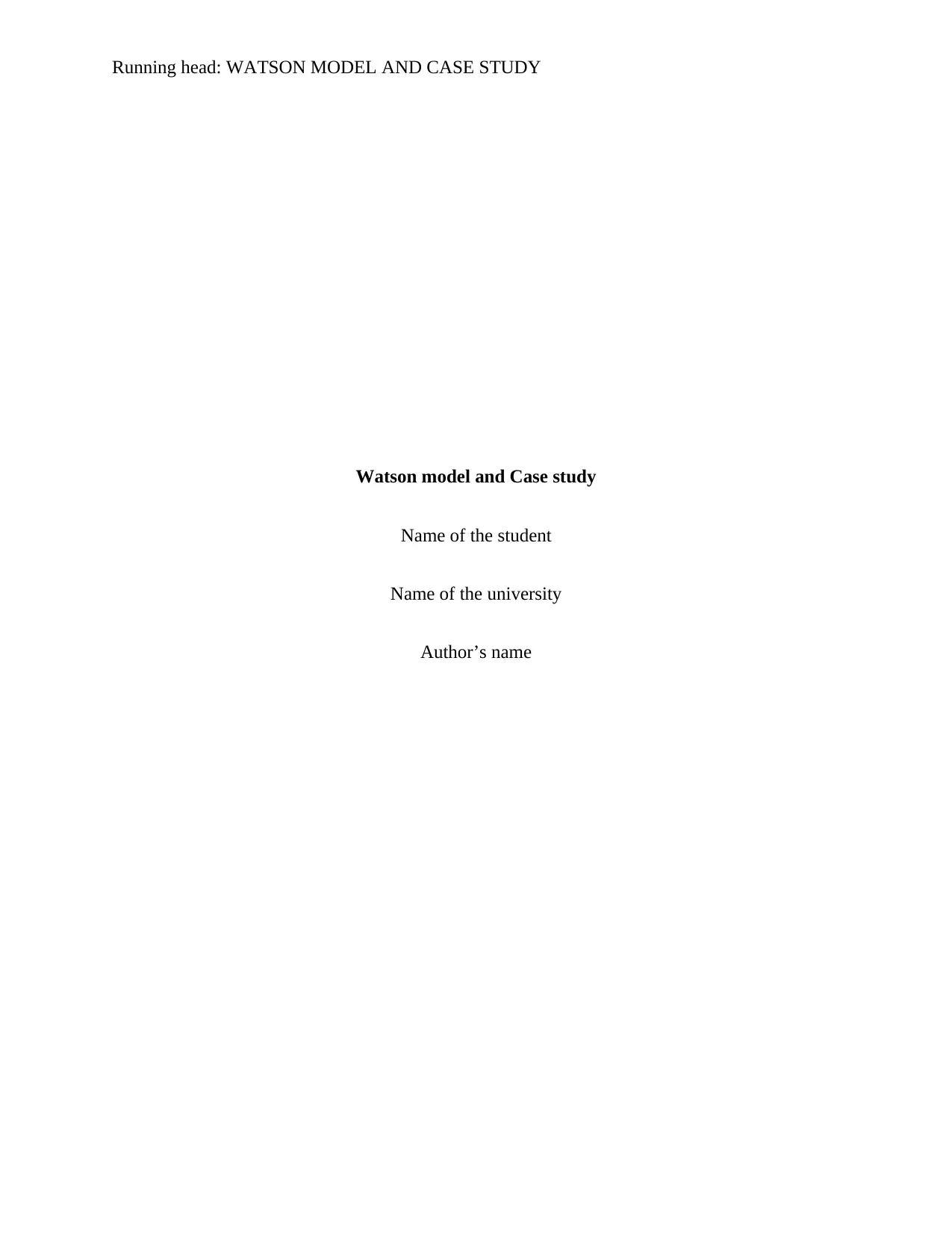
Running head: WATSON MODEL AND CASE STUDY
Watson model and Case study
Name of the student
Name of the university
Author’s name
Watson model and Case study
Name of the student
Name of the university
Author’s name
Paraphrase This Document
Need a fresh take? Get an instant paraphrase of this document with our AI Paraphraser
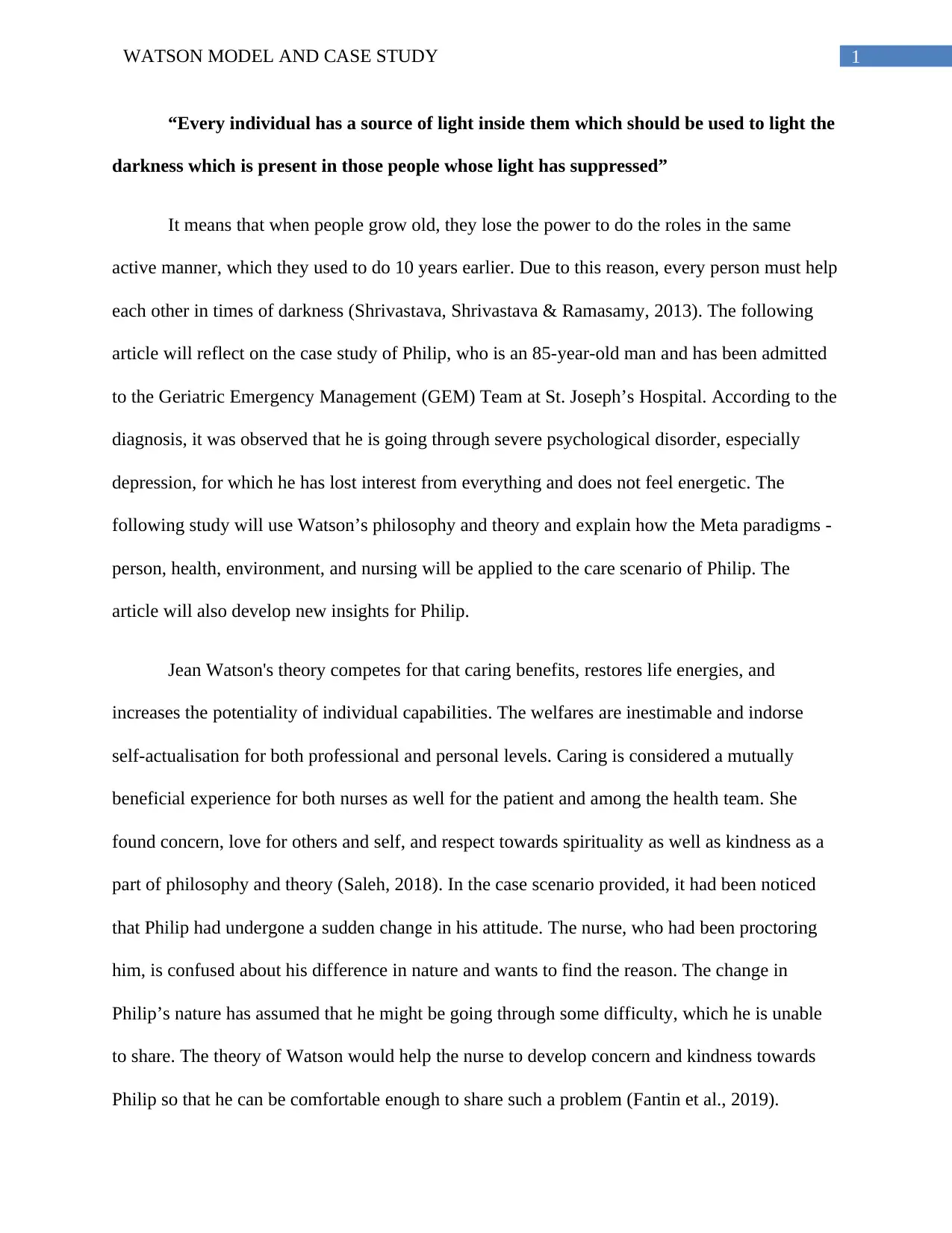
1WATSON MODEL AND CASE STUDY
“Every individual has a source of light inside them which should be used to light the
darkness which is present in those people whose light has suppressed”
It means that when people grow old, they lose the power to do the roles in the same
active manner, which they used to do 10 years earlier. Due to this reason, every person must help
each other in times of darkness (Shrivastava, Shrivastava & Ramasamy, 2013). The following
article will reflect on the case study of Philip, who is an 85-year-old man and has been admitted
to the Geriatric Emergency Management (GEM) Team at St. Joseph’s Hospital. According to the
diagnosis, it was observed that he is going through severe psychological disorder, especially
depression, for which he has lost interest from everything and does not feel energetic. The
following study will use Watson’s philosophy and theory and explain how the Meta paradigms -
person, health, environment, and nursing will be applied to the care scenario of Philip. The
article will also develop new insights for Philip.
Jean Watson's theory competes for that caring benefits, restores life energies, and
increases the potentiality of individual capabilities. The welfares are inestimable and indorse
self-actualisation for both professional and personal levels. Caring is considered a mutually
beneficial experience for both nurses as well for the patient and among the health team. She
found concern, love for others and self, and respect towards spirituality as well as kindness as a
part of philosophy and theory (Saleh, 2018). In the case scenario provided, it had been noticed
that Philip had undergone a sudden change in his attitude. The nurse, who had been proctoring
him, is confused about his difference in nature and wants to find the reason. The change in
Philip’s nature has assumed that he might be going through some difficulty, which he is unable
to share. The theory of Watson would help the nurse to develop concern and kindness towards
Philip so that he can be comfortable enough to share such a problem (Fantin et al., 2019).
“Every individual has a source of light inside them which should be used to light the
darkness which is present in those people whose light has suppressed”
It means that when people grow old, they lose the power to do the roles in the same
active manner, which they used to do 10 years earlier. Due to this reason, every person must help
each other in times of darkness (Shrivastava, Shrivastava & Ramasamy, 2013). The following
article will reflect on the case study of Philip, who is an 85-year-old man and has been admitted
to the Geriatric Emergency Management (GEM) Team at St. Joseph’s Hospital. According to the
diagnosis, it was observed that he is going through severe psychological disorder, especially
depression, for which he has lost interest from everything and does not feel energetic. The
following study will use Watson’s philosophy and theory and explain how the Meta paradigms -
person, health, environment, and nursing will be applied to the care scenario of Philip. The
article will also develop new insights for Philip.
Jean Watson's theory competes for that caring benefits, restores life energies, and
increases the potentiality of individual capabilities. The welfares are inestimable and indorse
self-actualisation for both professional and personal levels. Caring is considered a mutually
beneficial experience for both nurses as well for the patient and among the health team. She
found concern, love for others and self, and respect towards spirituality as well as kindness as a
part of philosophy and theory (Saleh, 2018). In the case scenario provided, it had been noticed
that Philip had undergone a sudden change in his attitude. The nurse, who had been proctoring
him, is confused about his difference in nature and wants to find the reason. The change in
Philip’s nature has assumed that he might be going through some difficulty, which he is unable
to share. The theory of Watson would help the nurse to develop concern and kindness towards
Philip so that he can be comfortable enough to share such a problem (Fantin et al., 2019).
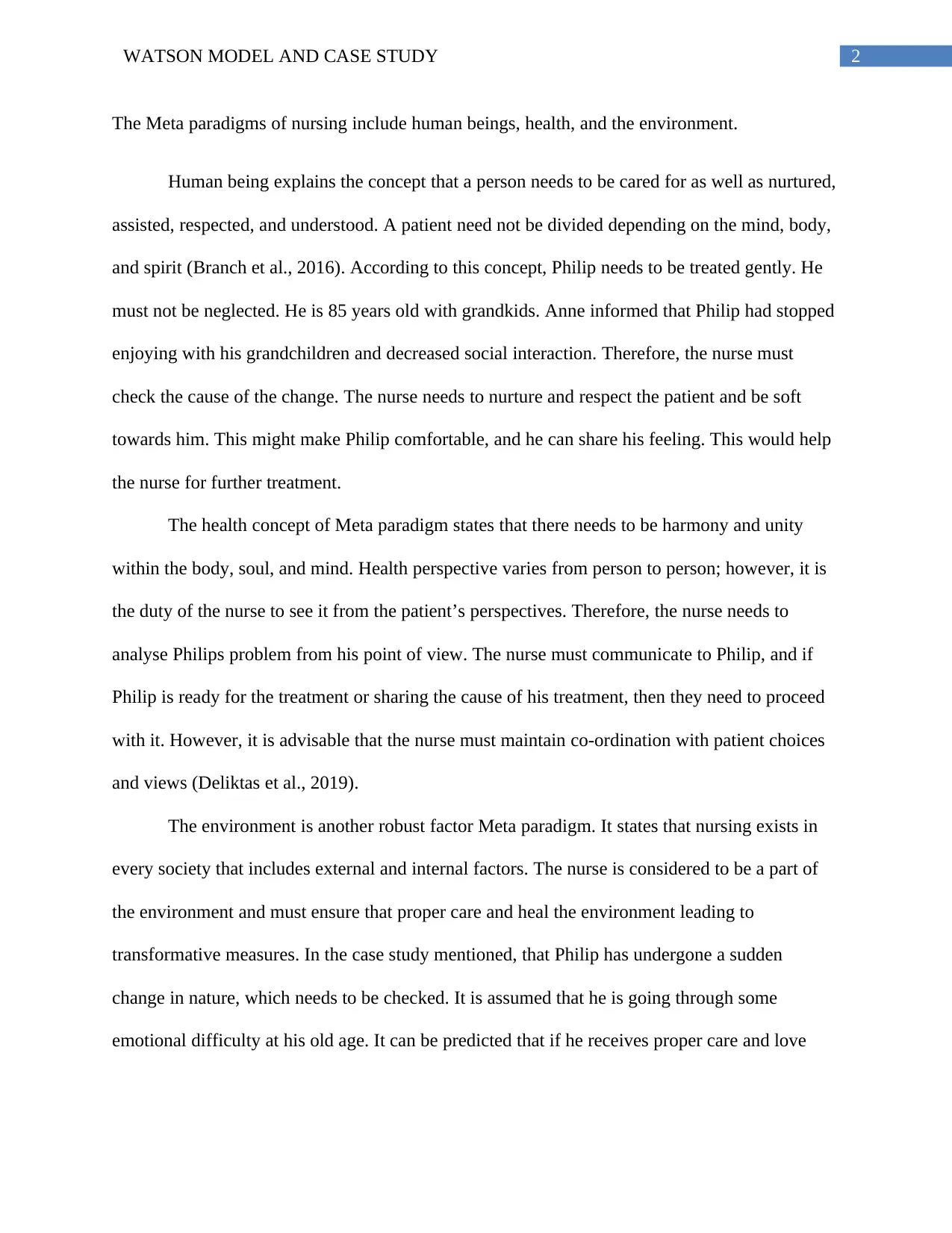
2WATSON MODEL AND CASE STUDY
The Meta paradigms of nursing include human beings, health, and the environment.
Human being explains the concept that a person needs to be cared for as well as nurtured,
assisted, respected, and understood. A patient need not be divided depending on the mind, body,
and spirit (Branch et al., 2016). According to this concept, Philip needs to be treated gently. He
must not be neglected. He is 85 years old with grandkids. Anne informed that Philip had stopped
enjoying with his grandchildren and decreased social interaction. Therefore, the nurse must
check the cause of the change. The nurse needs to nurture and respect the patient and be soft
towards him. This might make Philip comfortable, and he can share his feeling. This would help
the nurse for further treatment.
The health concept of Meta paradigm states that there needs to be harmony and unity
within the body, soul, and mind. Health perspective varies from person to person; however, it is
the duty of the nurse to see it from the patient’s perspectives. Therefore, the nurse needs to
analyse Philips problem from his point of view. The nurse must communicate to Philip, and if
Philip is ready for the treatment or sharing the cause of his treatment, then they need to proceed
with it. However, it is advisable that the nurse must maintain co-ordination with patient choices
and views (Deliktas et al., 2019).
The environment is another robust factor Meta paradigm. It states that nursing exists in
every society that includes external and internal factors. The nurse is considered to be a part of
the environment and must ensure that proper care and heal the environment leading to
transformative measures. In the case study mentioned, that Philip has undergone a sudden
change in nature, which needs to be checked. It is assumed that he is going through some
emotional difficulty at his old age. It can be predicted that if he receives proper care and love
The Meta paradigms of nursing include human beings, health, and the environment.
Human being explains the concept that a person needs to be cared for as well as nurtured,
assisted, respected, and understood. A patient need not be divided depending on the mind, body,
and spirit (Branch et al., 2016). According to this concept, Philip needs to be treated gently. He
must not be neglected. He is 85 years old with grandkids. Anne informed that Philip had stopped
enjoying with his grandchildren and decreased social interaction. Therefore, the nurse must
check the cause of the change. The nurse needs to nurture and respect the patient and be soft
towards him. This might make Philip comfortable, and he can share his feeling. This would help
the nurse for further treatment.
The health concept of Meta paradigm states that there needs to be harmony and unity
within the body, soul, and mind. Health perspective varies from person to person; however, it is
the duty of the nurse to see it from the patient’s perspectives. Therefore, the nurse needs to
analyse Philips problem from his point of view. The nurse must communicate to Philip, and if
Philip is ready for the treatment or sharing the cause of his treatment, then they need to proceed
with it. However, it is advisable that the nurse must maintain co-ordination with patient choices
and views (Deliktas et al., 2019).
The environment is another robust factor Meta paradigm. It states that nursing exists in
every society that includes external and internal factors. The nurse is considered to be a part of
the environment and must ensure that proper care and heal the environment leading to
transformative measures. In the case study mentioned, that Philip has undergone a sudden
change in nature, which needs to be checked. It is assumed that he is going through some
emotional difficulty at his old age. It can be predicted that if he receives proper care and love
⊘ This is a preview!⊘
Do you want full access?
Subscribe today to unlock all pages.

Trusted by 1+ million students worldwide
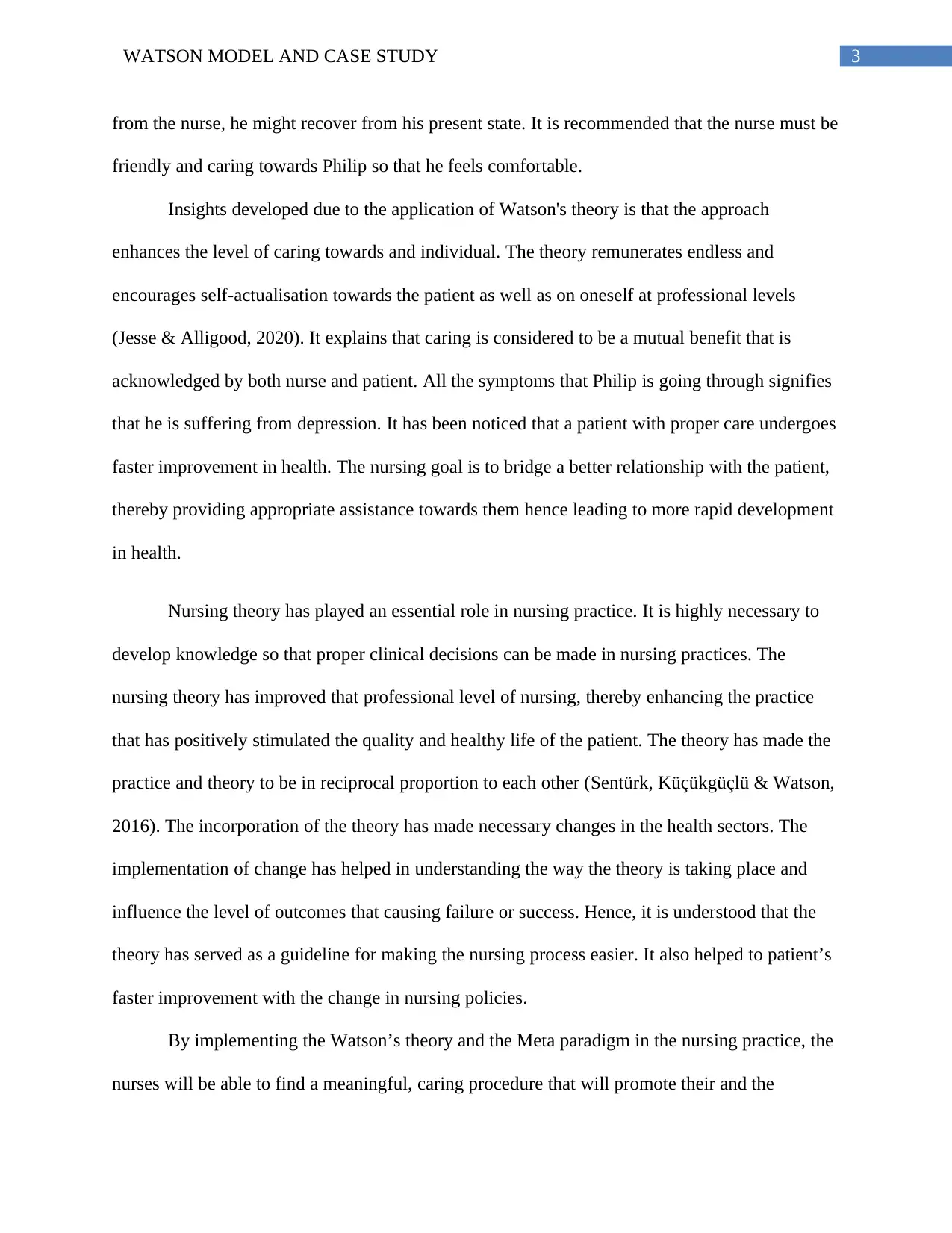
3WATSON MODEL AND CASE STUDY
from the nurse, he might recover from his present state. It is recommended that the nurse must be
friendly and caring towards Philip so that he feels comfortable.
Insights developed due to the application of Watson's theory is that the approach
enhances the level of caring towards and individual. The theory remunerates endless and
encourages self-actualisation towards the patient as well as on oneself at professional levels
(Jesse & Alligood, 2020). It explains that caring is considered to be a mutual benefit that is
acknowledged by both nurse and patient. All the symptoms that Philip is going through signifies
that he is suffering from depression. It has been noticed that a patient with proper care undergoes
faster improvement in health. The nursing goal is to bridge a better relationship with the patient,
thereby providing appropriate assistance towards them hence leading to more rapid development
in health.
Nursing theory has played an essential role in nursing practice. It is highly necessary to
develop knowledge so that proper clinical decisions can be made in nursing practices. The
nursing theory has improved that professional level of nursing, thereby enhancing the practice
that has positively stimulated the quality and healthy life of the patient. The theory has made the
practice and theory to be in reciprocal proportion to each other (Sentürk, Küçükgüçlü & Watson,
2016). The incorporation of the theory has made necessary changes in the health sectors. The
implementation of change has helped in understanding the way the theory is taking place and
influence the level of outcomes that causing failure or success. Hence, it is understood that the
theory has served as a guideline for making the nursing process easier. It also helped to patient’s
faster improvement with the change in nursing policies.
By implementing the Watson’s theory and the Meta paradigm in the nursing practice, the
nurses will be able to find a meaningful, caring procedure that will promote their and the
from the nurse, he might recover from his present state. It is recommended that the nurse must be
friendly and caring towards Philip so that he feels comfortable.
Insights developed due to the application of Watson's theory is that the approach
enhances the level of caring towards and individual. The theory remunerates endless and
encourages self-actualisation towards the patient as well as on oneself at professional levels
(Jesse & Alligood, 2020). It explains that caring is considered to be a mutual benefit that is
acknowledged by both nurse and patient. All the symptoms that Philip is going through signifies
that he is suffering from depression. It has been noticed that a patient with proper care undergoes
faster improvement in health. The nursing goal is to bridge a better relationship with the patient,
thereby providing appropriate assistance towards them hence leading to more rapid development
in health.
Nursing theory has played an essential role in nursing practice. It is highly necessary to
develop knowledge so that proper clinical decisions can be made in nursing practices. The
nursing theory has improved that professional level of nursing, thereby enhancing the practice
that has positively stimulated the quality and healthy life of the patient. The theory has made the
practice and theory to be in reciprocal proportion to each other (Sentürk, Küçükgüçlü & Watson,
2016). The incorporation of the theory has made necessary changes in the health sectors. The
implementation of change has helped in understanding the way the theory is taking place and
influence the level of outcomes that causing failure or success. Hence, it is understood that the
theory has served as a guideline for making the nursing process easier. It also helped to patient’s
faster improvement with the change in nursing policies.
By implementing the Watson’s theory and the Meta paradigm in the nursing practice, the
nurses will be able to find a meaningful, caring procedure that will promote their and the
Paraphrase This Document
Need a fresh take? Get an instant paraphrase of this document with our AI Paraphraser
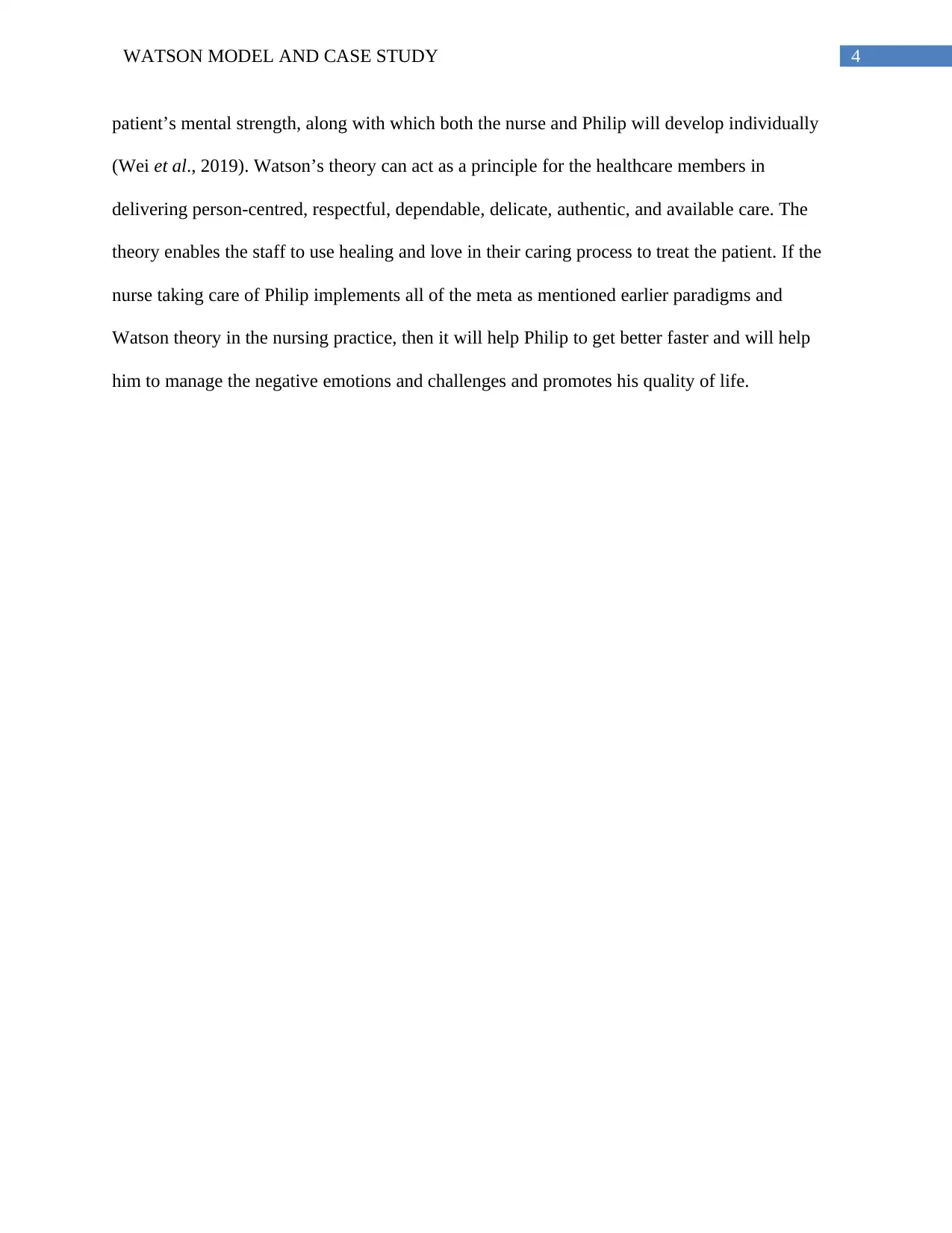
4WATSON MODEL AND CASE STUDY
patient’s mental strength, along with which both the nurse and Philip will develop individually
(Wei et al., 2019). Watson’s theory can act as a principle for the healthcare members in
delivering person-centred, respectful, dependable, delicate, authentic, and available care. The
theory enables the staff to use healing and love in their caring process to treat the patient. If the
nurse taking care of Philip implements all of the meta as mentioned earlier paradigms and
Watson theory in the nursing practice, then it will help Philip to get better faster and will help
him to manage the negative emotions and challenges and promotes his quality of life.
patient’s mental strength, along with which both the nurse and Philip will develop individually
(Wei et al., 2019). Watson’s theory can act as a principle for the healthcare members in
delivering person-centred, respectful, dependable, delicate, authentic, and available care. The
theory enables the staff to use healing and love in their caring process to treat the patient. If the
nurse taking care of Philip implements all of the meta as mentioned earlier paradigms and
Watson theory in the nursing practice, then it will help Philip to get better faster and will help
him to manage the negative emotions and challenges and promotes his quality of life.
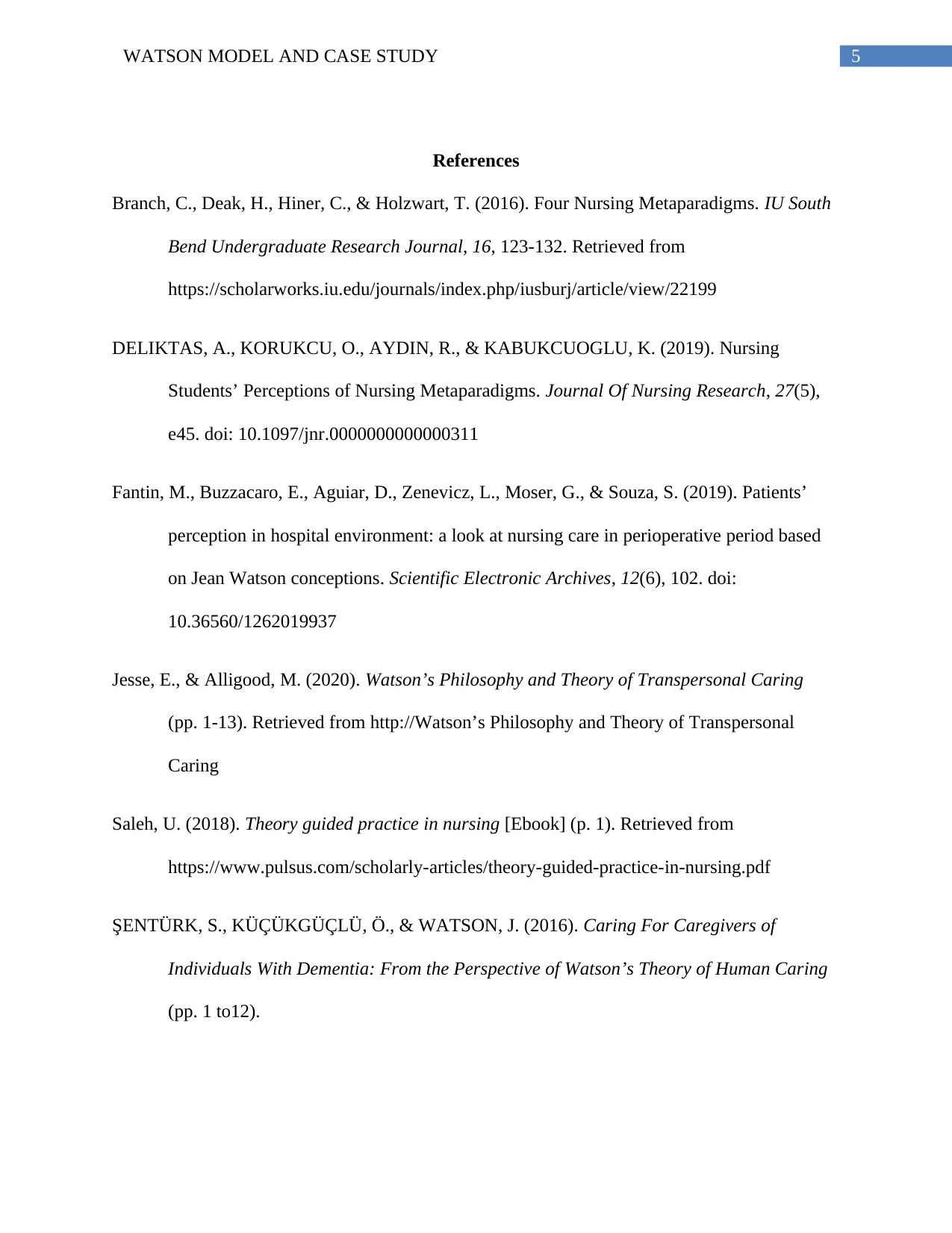
5WATSON MODEL AND CASE STUDY
References
Branch, C., Deak, H., Hiner, C., & Holzwart, T. (2016). Four Nursing Metaparadigms. IU South
Bend Undergraduate Research Journal, 16, 123-132. Retrieved from
https://scholarworks.iu.edu/journals/index.php/iusburj/article/view/22199
DELIKTAS, A., KORUKCU, O., AYDIN, R., & KABUKCUOGLU, K. (2019). Nursing
Studentsʼ Perceptions of Nursing Metaparadigms. Journal Of Nursing Research, 27(5),
e45. doi: 10.1097/jnr.0000000000000311
Fantin, M., Buzzacaro, E., Aguiar, D., Zenevicz, L., Moser, G., & Souza, S. (2019). Patients’
perception in hospital environment: a look at nursing care in perioperative period based
on Jean Watson conceptions. Scientific Electronic Archives, 12(6), 102. doi:
10.36560/1262019937
Jesse, E., & Alligood, M. (2020). Watson’s Philosophy and Theory of Transpersonal Caring
(pp. 1-13). Retrieved from http://Watson’s Philosophy and Theory of Transpersonal
Caring
Saleh, U. (2018). Theory guided practice in nursing [Ebook] (p. 1). Retrieved from
https://www.pulsus.com/scholarly-articles/theory-guided-practice-in-nursing.pdf
ŞENTÜRK, S., KÜÇÜKGÜÇLÜ, Ö., & WATSON, J. (2016). Caring For Caregivers of
Individuals With Dementia: From the Perspective of Watson’s Theory of Human Caring
(pp. 1 to12).
References
Branch, C., Deak, H., Hiner, C., & Holzwart, T. (2016). Four Nursing Metaparadigms. IU South
Bend Undergraduate Research Journal, 16, 123-132. Retrieved from
https://scholarworks.iu.edu/journals/index.php/iusburj/article/view/22199
DELIKTAS, A., KORUKCU, O., AYDIN, R., & KABUKCUOGLU, K. (2019). Nursing
Studentsʼ Perceptions of Nursing Metaparadigms. Journal Of Nursing Research, 27(5),
e45. doi: 10.1097/jnr.0000000000000311
Fantin, M., Buzzacaro, E., Aguiar, D., Zenevicz, L., Moser, G., & Souza, S. (2019). Patients’
perception in hospital environment: a look at nursing care in perioperative period based
on Jean Watson conceptions. Scientific Electronic Archives, 12(6), 102. doi:
10.36560/1262019937
Jesse, E., & Alligood, M. (2020). Watson’s Philosophy and Theory of Transpersonal Caring
(pp. 1-13). Retrieved from http://Watson’s Philosophy and Theory of Transpersonal
Caring
Saleh, U. (2018). Theory guided practice in nursing [Ebook] (p. 1). Retrieved from
https://www.pulsus.com/scholarly-articles/theory-guided-practice-in-nursing.pdf
ŞENTÜRK, S., KÜÇÜKGÜÇLÜ, Ö., & WATSON, J. (2016). Caring For Caregivers of
Individuals With Dementia: From the Perspective of Watson’s Theory of Human Caring
(pp. 1 to12).
⊘ This is a preview!⊘
Do you want full access?
Subscribe today to unlock all pages.

Trusted by 1+ million students worldwide
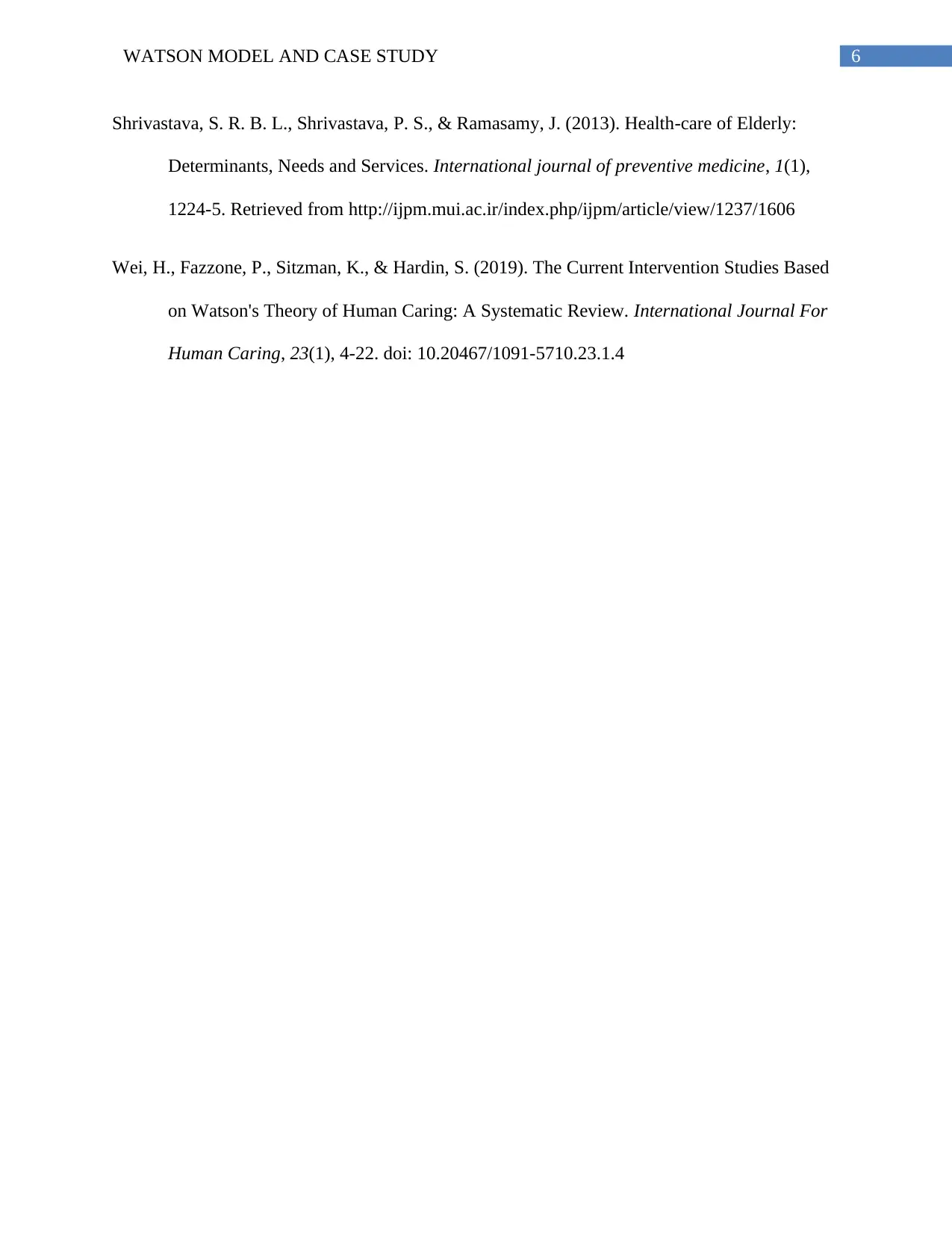
6WATSON MODEL AND CASE STUDY
Shrivastava, S. R. B. L., Shrivastava, P. S., & Ramasamy, J. (2013). Health-care of Elderly:
Determinants, Needs and Services. International journal of preventive medicine, 1(1),
1224-5. Retrieved from http://ijpm.mui.ac.ir/index.php/ijpm/article/view/1237/1606
Wei, H., Fazzone, P., Sitzman, K., & Hardin, S. (2019). The Current Intervention Studies Based
on Watson's Theory of Human Caring: A Systematic Review. International Journal For
Human Caring, 23(1), 4-22. doi: 10.20467/1091-5710.23.1.4
Shrivastava, S. R. B. L., Shrivastava, P. S., & Ramasamy, J. (2013). Health-care of Elderly:
Determinants, Needs and Services. International journal of preventive medicine, 1(1),
1224-5. Retrieved from http://ijpm.mui.ac.ir/index.php/ijpm/article/view/1237/1606
Wei, H., Fazzone, P., Sitzman, K., & Hardin, S. (2019). The Current Intervention Studies Based
on Watson's Theory of Human Caring: A Systematic Review. International Journal For
Human Caring, 23(1), 4-22. doi: 10.20467/1091-5710.23.1.4
1 out of 7
Related Documents
Your All-in-One AI-Powered Toolkit for Academic Success.
+13062052269
info@desklib.com
Available 24*7 on WhatsApp / Email
![[object Object]](/_next/static/media/star-bottom.7253800d.svg)
Unlock your academic potential
Copyright © 2020–2026 A2Z Services. All Rights Reserved. Developed and managed by ZUCOL.





